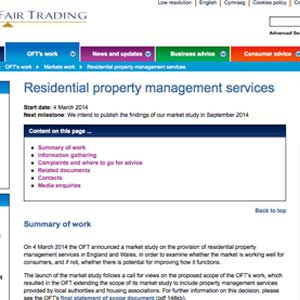 The Office of Fair Trading today announced its leasehold management inquiry and will include housing association and council leaseholders. The scope is defined here
The Office of Fair Trading today announced its leasehold management inquiry and will include housing association and council leaseholders. The scope is defined here
This was a key point urged by the Leasehold Knowledge Partnership and Campaign against retirement leasehold exploitation and, largely on their prompting, more than 100 leaseholders wrote to the OFT demanding their inclusion.
In a break from the OFT’s habitual glacial pace, the leasehold management inquiry, which will be taken over by the new Competition and Markets Authority, anticipates reporting in September.
The key issues to be examined are:
• leaseholders’ perceptions of value for money and the quality of services they receive;
• whether leaseholders have sufficient understanding of their rights and obligations with regard to the management of property;
• whether leaseholders have sufficient influence on decisions taken by freeholders in relation to the appointment of property managers;
• whether property managers and freeholders have the same interests as leaseholders in areas such as costs of maintenance work and/or buildings’ insurance and how such decisions are made;
• whether property managers’ and freeholders’ choice of contractors and services may be influenced by any links with associated companies and the availability of commissions;
• how leaseholders’ rights to self-management work in practice; for example, whether there are difficulties in co-ordinating leaseholders to work collaboratively, whether self-management gives good outcomes, and whether any problems may be more marked in some areas, such as for retirement properties;
• ‘switching levels’ and more generally whether competition between property managers is working well
• the current and proposed redress and complaint schemes available to leaseholders and any problems with those schemes, including the standard of customer service.
The OFT / CMA’s leasehold management inquiry could result in recommendations and enforcement action against businesses breaching competition or consumer law, and recommendations of regulatory changes to government.
It is essential that leaseholders make the best possible case for reform, and avoid intemperate or ill-directed submissions.
The “industry” will be operating a peak PR efficiency: its trade bodies will be blaming leaseholder ignorance of their communal obligations; trumpeting tokenistic (and tardy) redress schemes that aim to keep abuses out of the courts while piously incanting “transparency”.
Leaseholders must make substantiated statements, including court references if possible, showing how the leasehold “market” is flawed.
LKP / Campaign against retirement leasehold exploitation will shortly give guidance on how to make these submissions as persuasive as possible to the leasehold management inquiry.





 Campaign against Residential Leasehold Exploitation whistleblowers were THREATENED with prosecution if they went public over OFT’s toothless £500k investigation into Peverel-Cirrus
Campaign against Residential Leasehold Exploitation whistleblowers were THREATENED with prosecution if they went public over OFT’s toothless £500k investigation into Peverel-Cirrus





















